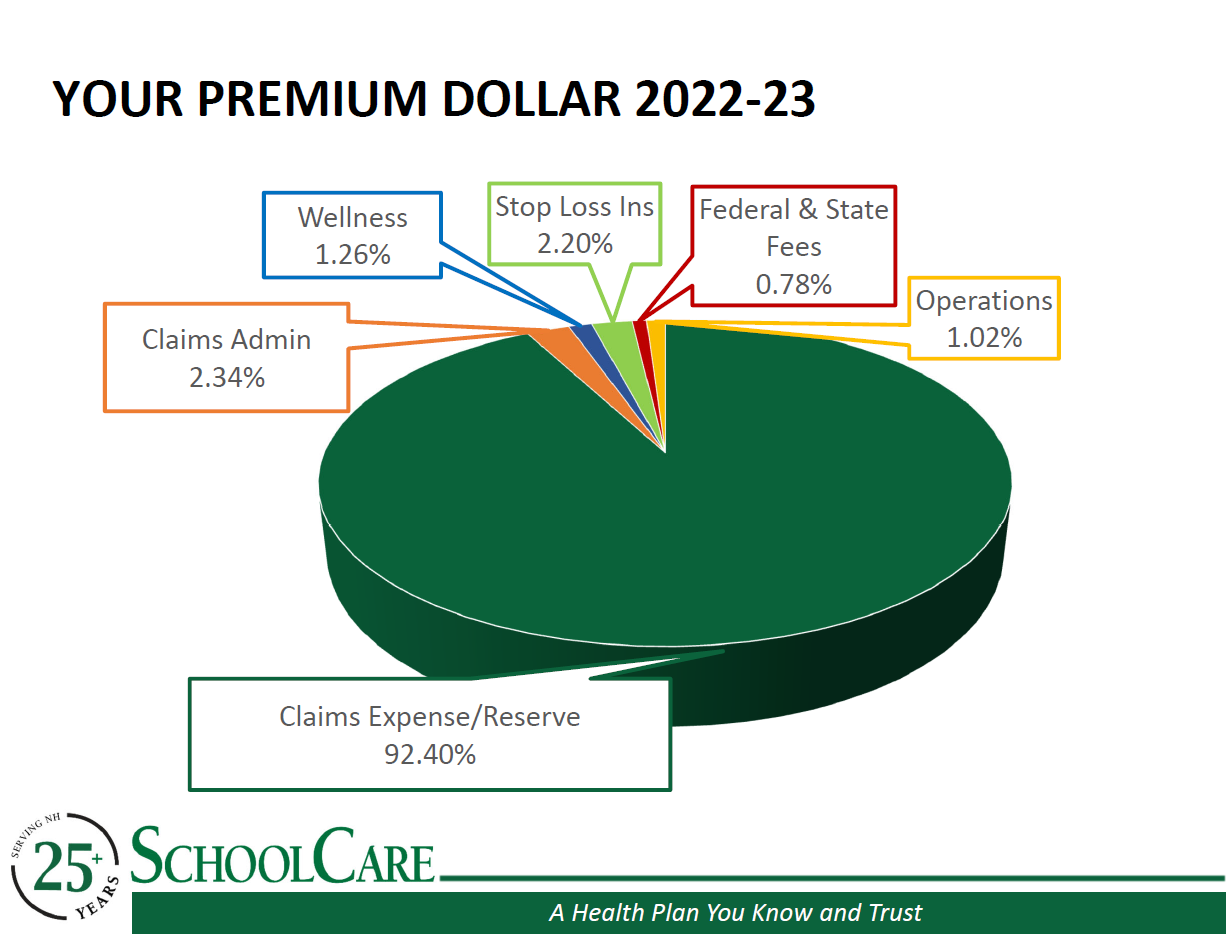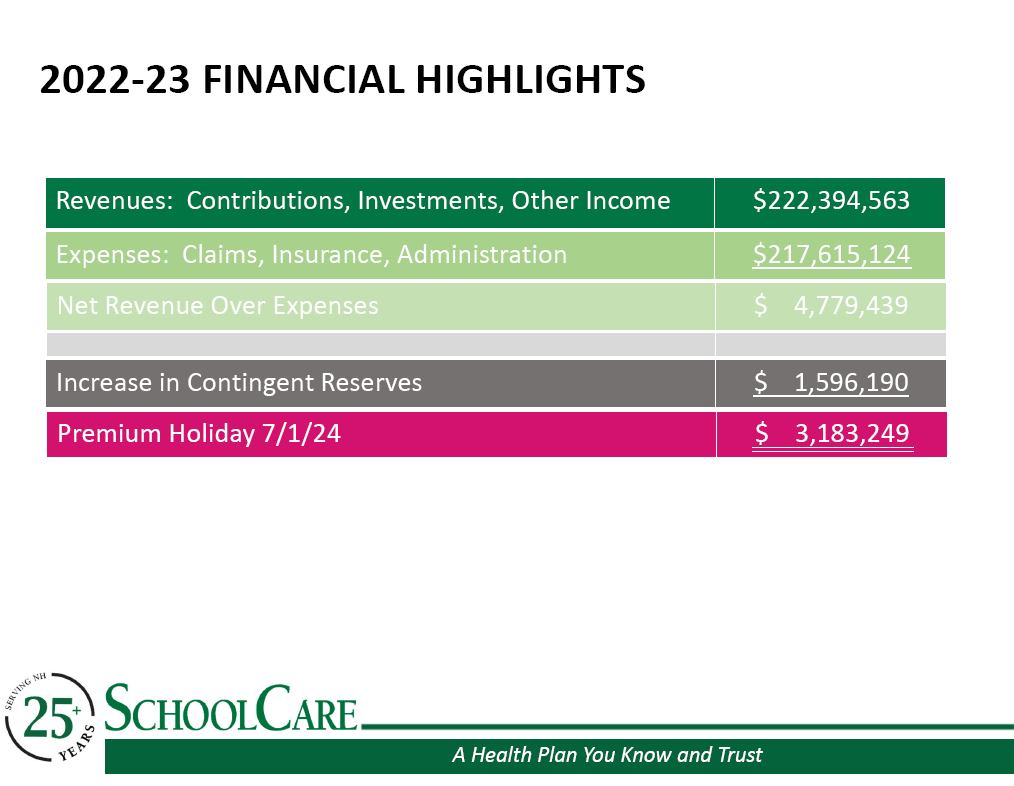Annual Meeting Highlights a Strong Year as it Returns to Pre-Pandemic Norms
Published December 21, 2023
On Tuesday, October 31st, SchoolCare leadership shared with Annual Meeting attendees that the organization is financially healthy and strong. Even in a time of rising inflation, Member Groups will see only single digit rate increases next year.
SchoolCare ’s 28th Annual Meeting was an opportunity for staff, the Board of Directors and Membership Council Representatives, and several guests to review audited financials and elect new members to the Board and Nominating Committee. It also included presentations on a couple of important topics – weight-loss medication coverage and the ongoing need among participants for behavioral health support – and concluded with a keynote presentation “Banish Burnout and Bounce Back” by Motivational Humorist Carol Ann Small.
 SchoolCare Associate Executive Director Melissa Perreault provided a high-level review of the FY2022-23 financial audit – the full audit can be found here – noting that it had been a good year for SchoolCare ’s 89 Employer Groups and nearly 26,000 participants. She addressed this year’s revenues and expenses (pictured, click to expand) noting a $3.2 million Premium Holiday that will be returned to SchoolCare ’s employer groups on July 1, 2024. With nearly $30 million in contingent reserves that are fully funded to actuarial-recommended levels, she said this is the backbone of SchoolCare ’s financial stability. Ms. Perreault also provided a pie chart (pictured, click to expand) breaking down how each dollar paid to SchoolCare is spent, with 92.4% going to claims and reserves and just 1% for operating expenses.
SchoolCare Associate Executive Director Melissa Perreault provided a high-level review of the FY2022-23 financial audit – the full audit can be found here – noting that it had been a good year for SchoolCare ’s 89 Employer Groups and nearly 26,000 participants. She addressed this year’s revenues and expenses (pictured, click to expand) noting a $3.2 million Premium Holiday that will be returned to SchoolCare ’s employer groups on July 1, 2024. With nearly $30 million in contingent reserves that are fully funded to actuarial-recommended levels, she said this is the backbone of SchoolCare ’s financial stability. Ms. Perreault also provided a pie chart (pictured, click to expand) breaking down how each dollar paid to SchoolCare is spent, with 92.4% going to claims and reserves and just 1% for operating expenses.
Executive Director Lisa Duquette provided an overview of how claims were spent last year, noting a 3.8% medical spend increase over FY2021-22. She noted the top cost area is musculoskeletal claims, but it has been mitigated using Hinge Health for joint and back pain. With rate trend indications from Cigna and the $3.2 million Premium Holiday, Ms. Duquette informed those in attendance that there would be an average effective overall medical plan rate increase of 6.2% and that no group will receive over a 9.7% effective rate increase from last year. For the dental plans she said there would be 4% average rate increase and no group offering SchoolCare ’s dental program would receive more than a 6% increase. She also announced that there will be a $20 increase to the frame allowance and contact lens benefit for VSP vision participants on July 1, 2024, with no change to the rates that decreased by 20% in 2023.
Board and Committee Elections
Nominating Committee Chairman Nathan Lunney conducted the election for the Board of Directors and the Nominating Committee. The 10-member Board of Directors, with equal representation of employee and employer interests, had five open seats and Mr. Lunney said five candidates submitted the required forms to run for those seats.
Running for Employee Representative seats were:
- Terry Burlingame, a Spanish and ESL teacher at Gilmanton School District, running for the one-year balance of a three-year term
- Lisa Simko, a kindergarten teacher in the Dover School District, running for a three-year term.
Running for Employer Representative seats were:
- Jennifer Burk, incumbent, Business Administrator for Hudson School District, running for a three-year term
- Kathy O’Blenes, incumbent, Business Administrator for the Governor Wentworth Regional School District, running for a three-year term
- Carole Annach, Business Manager for Strafford Learning Center, running to fill the two-year balance of a three-year term
Mr. Lunney said the Coalition by-laws also require the annual election of a Nominating Committee by the Membership Council and this year there were four open seats.
The candidates for the Nominating Committee were:
- Vicki Drouin, Employer Representative from Barrington School District
- Nathan Lunney, Employer Representative from Portsmouth School Department
- Derek Pappaceno, Employee Representative from Alton School District
- Laura Lee, Employee Representative from Londonderry School District
There were no additional nominations for the Board or Nominating Committee and there was no further discussion. All nine candidates were elected in a unanimous voice vote.
Weight Loss Medications
During the business meeting, Ms. Duquette introduced Steven Gattuso registered pharmacist and Clinical Pharmacy Consultant for Cigna, and Tracy Mungeam, a Senior Director at Willis Towers Watson (WTW) to present about the clinical and financial considerations for potentially adding weight-loss medications to SchoolCare ’s coverage.
Weight-loss medications are not currently covered for SchoolCare /Cigna participants. Mr. Gattuso said the industry standard has long been to exclude weight loss drugs from coverage citing lack of proven long-term efficacy and safety data as reasons. During his presentation he explained how the medications work, the potential side-effects and that while not covered for weight-loss purposes only, GLP-1 agonists such as Ozempic and Mounjaro are covered for members with diabetes diagnoses. He noted that this is a rapidly changing sector of the pharmaceutical market with new drugs and potential weight loss pills in the pipeline. Mr. Gattuso concluded his presentation by sharing that Cigna offers a weight loss buy-up program of which approximately 25% of all Cigna employer groups provide at an additional cost. He also shared that Cigna is developing new programs to be offered in conjunction with weight loss medications to help aid in lifestyle improvements.
Ms. Mungeam provided more insight into the cost of the drugs and potential costs to SchoolCare ’s membership. She showed a chart illustrating the cost over the past two years for other health plans, which showed a significant year-over-year increase from an average of $.92 cents Per Member Per Month (PMPM) to $6.60 PMPM between 2021 and 2023. The chart also illustrated a nearly $11 PMPM estimate from Cigna – or more than $2.5 million that would be added to SchoolCare’s rates for 2024-25, if it elected a buy-up program. Ms. Mungeam advised that actual costs could be significantly higher than that citing potential utilization increases as manufacturing increases, the number of drugs increases and as medications come onto the market in pill form. In the future, she said there is the potential for competition but that will take time to have a mitigating financial effect.
WTW’s recommendation to SchoolCare was to continue to review, but to defer any action at this time. Ms. Duquette said this information was presented to the Board on October 16th and the Board voted unanimously to share this information at the meeting but did not recommend further action be taken at this time. There were questions from attendees and discussion, but no further action was taken.
Behavioral Health Support
Group Relations Specialists Chris Glenn and Jana McCusker provided a presentation that highlighted the many ways that behavioral health-related issues can impact SchoolCare participants and employers, using fictional stories to set up circumstances in which people might utilize Cigna’s virtual behavioral health options, the Employee Assistance Program or in-person services. They shared a slide that showed claims data from last year indicating 37% of SchoolCare participants have a behavioral health diagnosis, as compared to Cigna’s national average of 25%. Claims data showed a 3% increase in behavioral health visits and that the top three conditions were anxiety, reactive stress disorder and depression.
They also shared a video, which explained Cigna’s Guided Navigation for Behavioral Health, resources available and how to access them at myCigna.com. Ms. McCusker provided an overview of the virtual care options available as well as the Employee Assistance Program, and displayed a poster for attendees to bring back to their buildings that show virtual care programs available and their relative cost to help participants find the care they need when they need it.

















